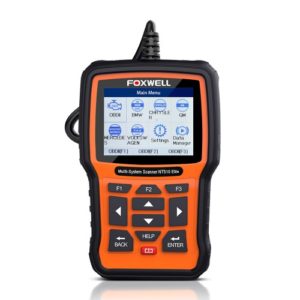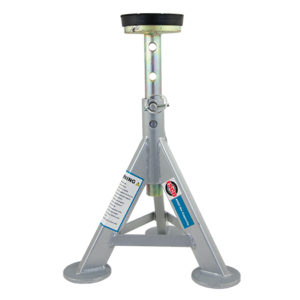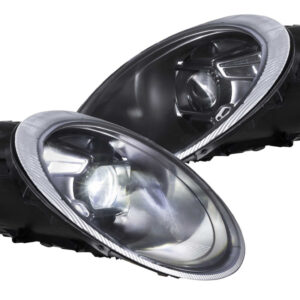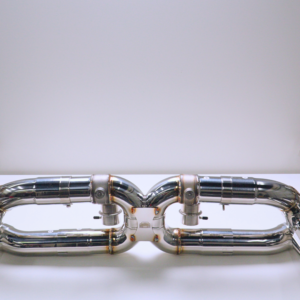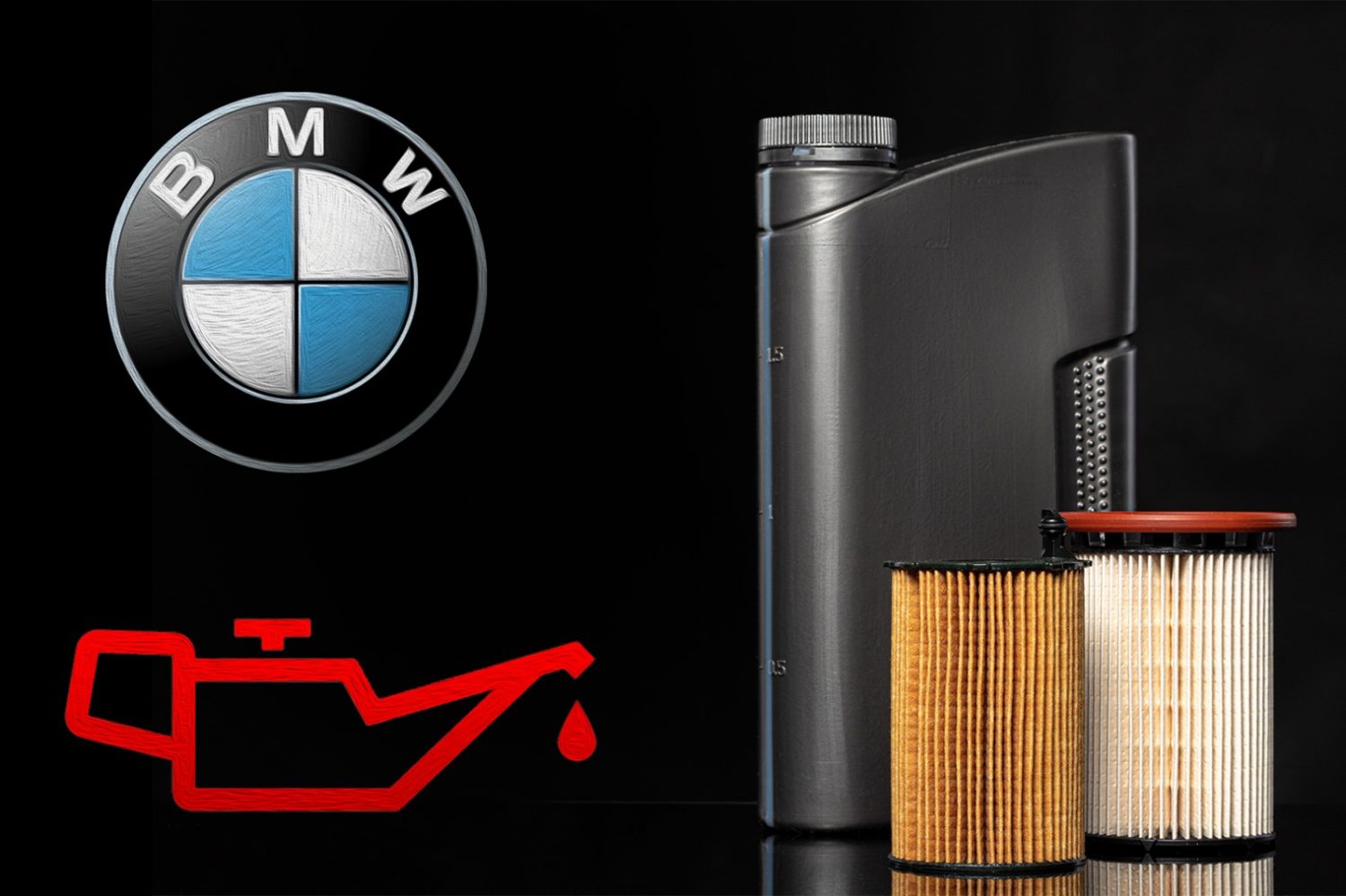
BMW Oil Change Quick Answers
A BMW oil change costs on average around $180 to $250 at a BMW dealership or $120 to $180 at an independent mechanic. However, for around $80, you can do-it-yourself (DIY), which we’ll explain in this article.
BMW recommends you to change the oil in your car every 10,000 miles or a year whichever comes first. But you should change it sooner than that if you want to prolong your engine’s life. More on that below.
You can also save money on your oil change by visiting a recommended independent mechanic near you.

Why Does a BMW Oil Change Cost This Much?
BMW is a European luxury car manufacturer and, like everything under the “luxury” category, it’s not cheap to service. Both independent mechanics and dealerships use the same price structure. The price of parts, labor, and taxes determine the whole budget. Let’s take a look at how much you can expect to pay based on whether you DIY, visit an independent mechanic, or go with a dealership.
Parts Required
You will be paying around $60 to $100 just in parts, which will consist of genuine BMW or OEM quality synthetic oil, an oil filter, an oil filter sealing ring, and a drain plug seal. You can save money by purchasing these parts online and either doing-it-yourself or going to an independent mechanic that accepts outside parts. While it might seem strange that you can buy parts online for cheaper, dealerships and independent mechanics certain get their parts for cheaper but typically do not pass the savings onto customers. So now that you know how much genuine parts and fluids should cost, run away from any place that offers you an oil change for $19.99!
| Part | BMW Mechanic Costs | Do-It-Yourself Costs |
| Synthetic oil (6 to 10 quarts) | $48 to $80 (@ $8 per quart) | $36 to $60 (@ $6 per quart) |
| Oil filter & sealing ring | $30 | $20 |
| Drain plug seal | $4 | $2 |
| Parts Total | $82 to $114 | $58 to $82 |
Labor Cost
You will be paying around $80 to $120 in labor depending on whether you go with an independent mechanic or a dealership. Labor costs are usually broken down into two categories, labor rate and labor time required. BMW dealerships and independent mechanics usually charge around an hour of labor for an oil and filter change. However, it usually takes them anywhere between 15 to 30 minutes to do with specialized equipment.
Taxes & Other Fees
There are only two things certain in life, death, and taxes! So, just like almost everything, factor in an additional 10-15% on top of everything for taxes and miscellaneous fees such as environmental, disposal, and shop supply fees.
When Should I Change My BMW’s Oil?
There are many different engine oils that car manufacturers use. The oil and the service interval are specified by the factory according to the engineering structures of these engines and the climates where they are used. This range is based on miles and time, so even if you don’t use your car at all, there is an expiration date for the engine oil and filter.
BMW recommends an oil change every 10K miles, which is a longer service interval than manufacturers that use conventional oil. However, you may need to change your oil more frequently based on your driving style (e.g. daily commuting, track driving, etc). We recommend replacing your engine oil every 5k miles or 1 year, whichever comes first, because this is an easy way to extend the life of your engine.
Which Engine Oil Should be Used on Your BMW
You can easily find out the most suitable engine oil type for your vehicle by looking at the oil change chart located under the hood, on the chassis, or around the engine block. BMW engines use synthetic oil only so you should be careful when you are choosing a brand.
Our recommendation is Mobil 1 European Car Full Synthetic Motor Oil 0W-40, which is custom made for European cars and is the factory fill for most BMWs and luxury European vehicles. Motul and Liqui Moly are also very popular among BMW owners.
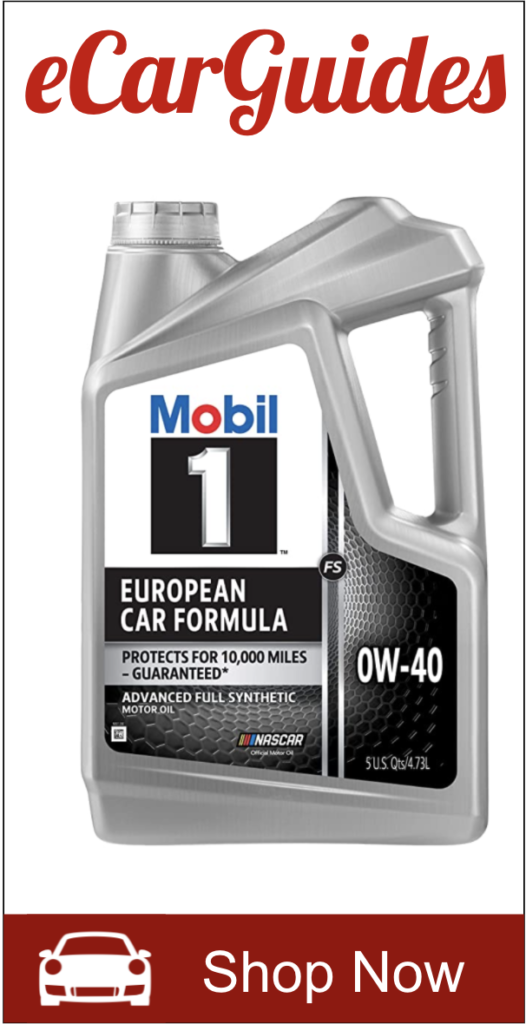 |
Why Synthetic Oil?
Engine oils consist of base oil and additives. Since synthetic oils contain more refined base oils than ordinary mineral oils, they provide outstanding protection and performance and last longer than conventional oil. Synthetic engine oils also offer a variety of benefits, including anti-wear, engine cleaning, improved circulation, and corrosion resistance to keep your engine performing at its best for years to come.
What Happens If The Engine Oil Is Not Changed?
As engine oil ages, its viscosity decreases and so does the oil filter’s ability to filter abrasive particles. Engine oil that has lost its properties cannot lubricate an engine properly which leads to increased engine wear and potential overheating. Old engine oil can also cause noisy engine operation, serious mechanical problems, and even total engine failure.

Does Engine Oil Change Improve Vehicle Performance?
An oil change won’t improve the performance of a healthy engine. However, not changing your oil will lead to premature engine wear and, ultimately, engine failure. Major parts such as the engine bearing, pistons, rings, and cylinder walls need lubrication to prevent metal-on-metal contact, friction, and overheating. So while an oil change doesn’t improve performance, it prevents your engine’s performance from degrading over time.
Can I Change My BMW’s Oil Myself?
Safety always comes first when it comes to vehicle maintenance. Therefore, if you are changing the oil for the first time or even if you have changed the oil many times before, there are some rules that you must follow to perform the engine oil change process safely and efficiently.
Let’s take a look at what you need before changing your engine oil;
- Foxwell NT530 Diagnostic Scanner (tool to reset oil indicator)
- Mechanic’s Tool Set
- Oil Filter Socket
- Hex Bit Socket for Drain Plug
- Torque Wrench
- Low Profile Oil Drain Pans, Pair – 6 Quarts Capacity Each
- Jack Stands
- Wheel Chocks
- Long Neck Fluid Funnel
- Disposable Gloves
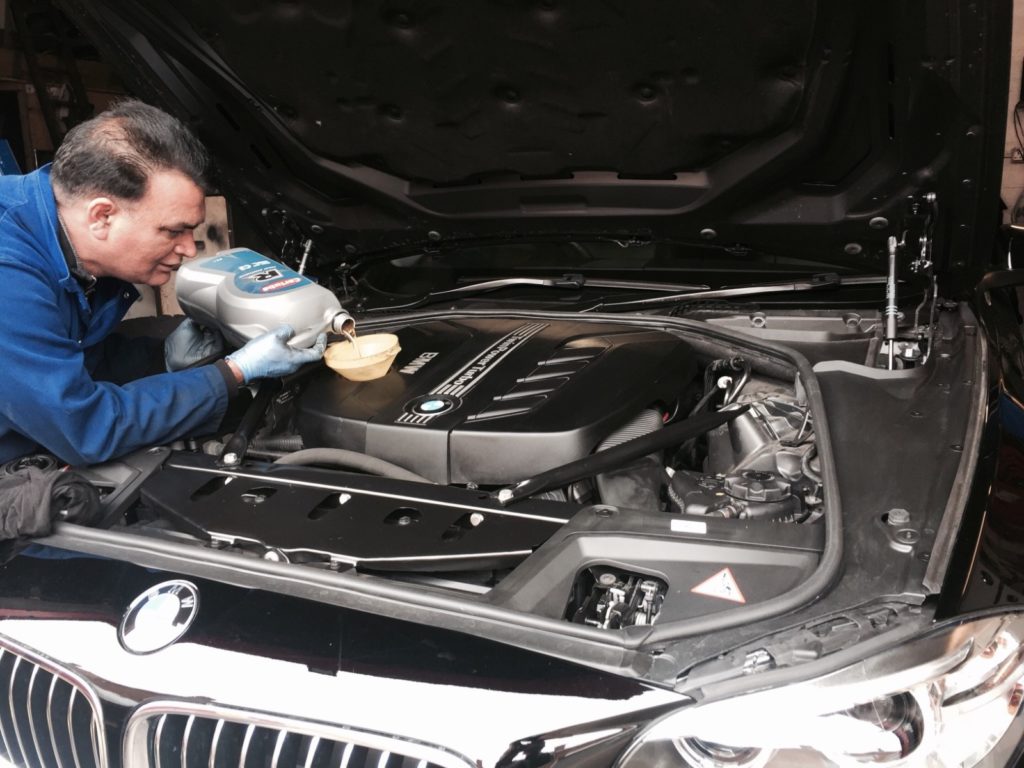
Getting Ready
Cooled oil will not be drained correctly. Therefore, before starting work, drive your car for 5 minutes to bring the oil up to normal operating temperature. Park your car on a flat and level surface, then turn off the engine. Open the hood and remove the oil filler cap, which will allow the oil to flow freely when you drain it.
Next, you will need get enough clearance under your engine for you to slide under. If you need to jack up your car, start by placing wheel chocks behind the rear wheels. Jack the front of the car up and place your car on jack stands like these ESCO jack stands. NEVER get under a car that is only supported by a jack.
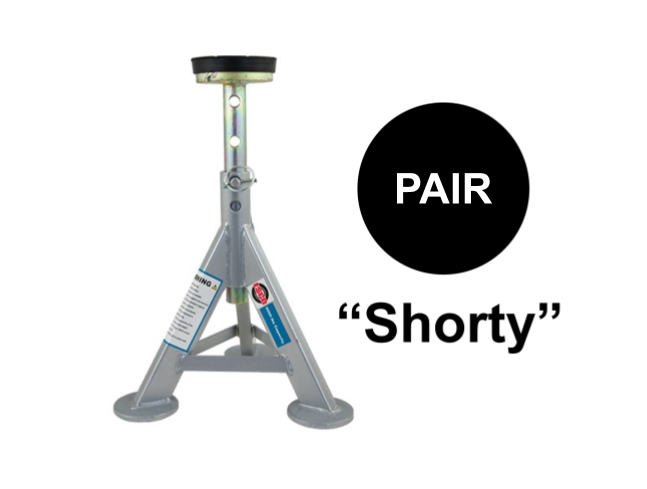
Drain the Oil & Remove the Oil Filter
Remove the panels under your engine and place a drain pan underneath the oil drain plug to collect the draining oil. Using the appropriate socket, break the drain plug free. Then, with a glove on, carefully remove the drain plug by hand. Quickly remove the drain plug and move it and your hand out of the way of the flowing oil, which will be hot. Do not let the drain plug drop into the drain pan. Also, if the drain plug seal is still on, remove it since you’ll be replacing it with a new one.
While the oil is draining, locate and loosen the oil filter with the appropriate oil filter wrench or socket. Place a drain pan underneath the oil filter and carefully remove the oil filter without touching any of the hot engine components. The oil filter may be heavy as it may be filled with oil. Therefore, slowly lower it away from the engine and empty the contents into the drain pan. Some oil filters are in a horizontal position and can leak dirty and hot engine oil when loosened. Be prepared for this spill by carrying a rag or cloth with you.
Install the Oil Filter & Fill the Oil
Take the new oil filter and seal and install it into the oil filter cap. Apply a light coat of new oil to the oil filter seal. Screw the new oil filter onto the engine. The filter should screw on easily when placed correctly. Tighten the filter manually until it is snug, then use a torque wrench to torque it to spec. Now, clean the drain plug, place a new seal on it, reinstall it onto the drain pan, and torque it to spec.
Lower your car. Do not start the engine at this stage. Otherwise, significant damage may occur. On top of the engine, place a funnel into the oil fill. Fill your engine with new oil, but add 0.5 quarters less than the oil capacity to prevent overfilling. Replace the cap and wipe up any spilled oil. Start your engine and let it run for a few minutes, turn it off, and then check the oil level again with the dipstick. Top off the engine oil as necessary.
Finally, reset the oil indicator using a diagnostic tool like the Foxwell NT530 Diagnostic Scanner (for BMW).
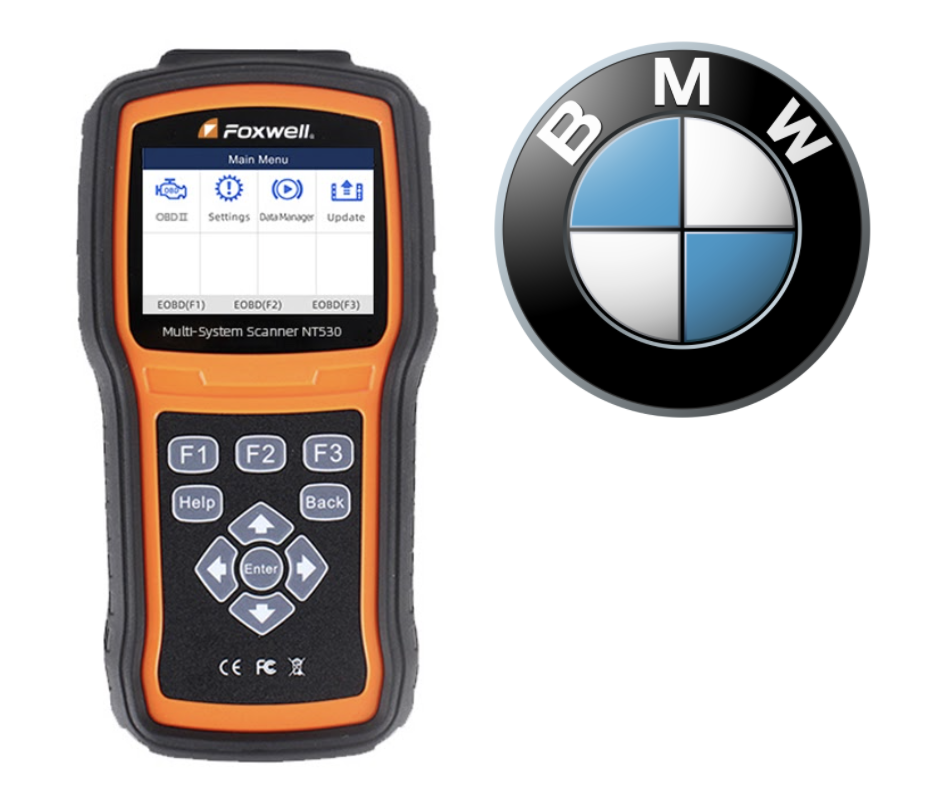
Dispose the Old Oil
The last and, in a way, the most important step in your oil change process is the correct disposal of the old oil you drained from the engine. Old engine oil is very harmful to the environment and its safe disposal is of paramount importance. Transfer the old oil to a sealable container and recycle it at your local auto parts store.

Summary
Change your BMW’S engine oil and filter every 5k miles or 1 year, whichever comes first, so you can enjoy your ultimate driving machine for a long time. It is going to cost you $180 to $250 at the dealership and around $120 to $180 at an independent mechanic. If you are going to do it yourself, expect to spend around $80.
Here at eCarGuides, our goal is to help car owners make the best decisions possible when it comes to maintaining their vehicles. Find a highly-rated BMW mechanic near you and detailed DIY guides for your BMW.

